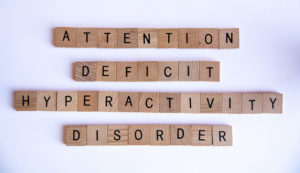When the words attention deficit hyperactivity disorder (ADHD) are mentioned, thoughts about children usually come to mind. We picture children fidgeting in their seats, unable to pay attention as representative of the disorder.
 But this is not a disorder that is limited to children. At least 4-5% of adults have ADHD in the U.S. alone. Without acknowledgment and treatment, living with ADHD as an adult can feel like an uphill battle without any hope for relief.
But this is not a disorder that is limited to children. At least 4-5% of adults have ADHD in the U.S. alone. Without acknowledgment and treatment, living with ADHD as an adult can feel like an uphill battle without any hope for relief.
The American Psychiatric Association states that ADHD affects about 5% of children, with half the number growing out of it by adulthood. The other 50% (equally distributed among men and women) will carry the symptoms of the disorder into adulthood.
Of course, with the number of improper diagnoses, this percentage could be higher. Many people aren’t aware they have ADHD and when they discover this fact, they admit that they have felt like they’ve been wrestling with an invisible opponent all their lives.
Understanding the Symptoms of Adult ADHD
Children with ADHD display prominent symptoms, but these symptoms become more challenging to properly diagnose in adulthood. The broad range of symptoms that identify an adult with ADHD includes emotional outbursts, impulsivity, and hyperactivity. Because of these symptoms, an adult with ADHD might struggle with:
- Following directions
- Concentrating
- Any tasks requiring organization
- Remembering key information
- Finishing work on time
These individuals might be experiencing anxiety, depression, trouble managing anger, forgetfulness, problems at work, low self-esteem, substance abuse, addiction and relationship issues.
Patterns Formed in Childhood
![]() Adults with ADHD would have shown signs in early childhood. Instead of growing out of ADHD, like researchers once believed, these patterns evolve into what was explained above. Many adults with ADHD may have been classified as underachievers or been required to repeat a grade. As they grew older, they may have even dropped out of school.
Adults with ADHD would have shown signs in early childhood. Instead of growing out of ADHD, like researchers once believed, these patterns evolve into what was explained above. Many adults with ADHD may have been classified as underachievers or been required to repeat a grade. As they grew older, they may have even dropped out of school.
As adults, this pattern continues but now looks like an inability to keep a job for long because of poor performance.
Why ADHD Adults Need to Work With A Therapist
ADHD is a mental health disorder that can be better managed by working with a Christian counselor. While medication can be helpful, a counselor can introduce different techniques to assist a person battling ADHD. It’s critical for individuals to fully understand the impact of ADHD in adulthood and process ways to overcome its impact.
If the individual is able to commit to plans and finish tasks that they have started, they will feel like they have some control over their disorder. Our culture revolves around structure, order, and routine. These are the enemies of someone with impulse control issues.
People with ADHD become bored easily and often rebel by acting as they please in the workplace. This is also why it’s common for people living with ADHD to get divorced and remarried multiple times.
The Importance of a Correct Diagnosis
ADHD is partially genetic. If you’ve noticed symptoms in your other family members, it could be an indicator you are struggling with the same disorder, but there are many other areas to discuss in order to diagnose someone with ADHD.
The key to making a correct diagnosis is to look at behavioral problems and determine if they occur in every area of life or just specific ones. If you can’t stay on track at work, but you can engage in a lengthy conversation with a friend, chances are that it’s a lack of interest that’s causing your lack of focus. Accurately diagnosing ADHD is an important part of the therapy session.
A Safe Environment to Discover Yourself
 Counseling offers people a safe place to come and experiencing healing without judgment or fear. In a counseling session, behavior modifications will be discussed to help individuals find appropriate and beneficial responses to everyday situations.
Counseling offers people a safe place to come and experiencing healing without judgment or fear. In a counseling session, behavior modifications will be discussed to help individuals find appropriate and beneficial responses to everyday situations.
The counselor and the individual will develop coping strategies that make living life with ADHD more manageable. The goal is to discover which solutions work for the individual in order to help improve their attention levels.
As the roots of the concentration issues are examined, childhood behaviors and unaddressed issues might come to the surface. This makes a counseling environment even more critical to addressing any memories and moving forward in life.
Rewiring the Brain
Cognitive Behavioral Therapy (CBT) takes unhealthy thinking patterns that plague someone with ADHD and turns them into healthy habits that enable them to function in society. This therapy can help to stop the individual from magnifying minor problems and seeing the negative in everything.
The process helps to remove those thoughts of low self-worth with thoughts that will boost self-esteem. Many people see early results using this therapy which motivates them to continue retraining the brain.
The Impact of Talk Therapy
Talking about problems and concerns, instead of keeping them suppressed, is highly effective in alleviating some of the bottled stress. Often a family session is suggested since ADHD can severely impact marriages and children.
With a strong support structure at home, it’s easier to combat anxiety, stress, mood swings and other impulses that are associated with the illness. Medication can treat the impulsivity and inability to focus, but therapy can help heal broken relationships, create daily routines and discover ways to stay motivated while performing monotonous tasks.
Battling Low Self-Esteem Issues
 Working through issues of low self-esteem and the depression that often follows is a part of counseling. Often the shame of being labeled an “underachiever” or constantly being called “stupid” has made a dent in a person’s self-worth. It will take time and hard work to build up that self-confidence again, but recovery is possible.
Working through issues of low self-esteem and the depression that often follows is a part of counseling. Often the shame of being labeled an “underachiever” or constantly being called “stupid” has made a dent in a person’s self-worth. It will take time and hard work to build up that self-confidence again, but recovery is possible.
It’s common to have repressed grief, from living your whole life with negative thoughts bombarding you and suffering continual setbacks. The inability to have a successful career or long-term happy relationships can lead to a state of helplessness and despair.
It takes support and fresh thinking to imagine a brighter future in which you are living a fulfilled life. ADHD is not going to go away, but you can develop habits and practices that will help you live your best possible life.
Christian Counseling and ADHD
If you can relate to the topics discussed, it’s the perfect time to reach out to a Christian counselor to continue your progress toward freedom. A Christian counselor will blend the benefits of traditional psychology with biblical principles.
Everything needed for living is within the pages of the Bible, and a counselor can help identify the right tools for you. Incorporating faith and Christian values into the overall strategy for living with ADHD can strengthen you emotionally, mentally, and spiritually.
For nothing will be impossible with God. – Luke 1:37
“Frazzled”, Courtesy of Tim Gouw, Unsplash.com, CC0 License; “Conversation,” courtesy of rawpixel.com, unsplash.com, CC0 License; “ADHD Scrabble Tiles,” courtesy of PracticalCures.com, Flickr Creative Commons 2.0, CC0 License; “Brain sketch,” courtesy of ElisaRiva, pixabay.com, CC0 License
-
Kate Motaung: Curator
Kate Motaung is the Senior Writer, Editor, and Content Manager for a multi-state company. She is the author of several books including Letters to Grief, 101 Prayers for Comfort in Difficult Times, and A Place to Land: A Story of Longing and Belonging...





